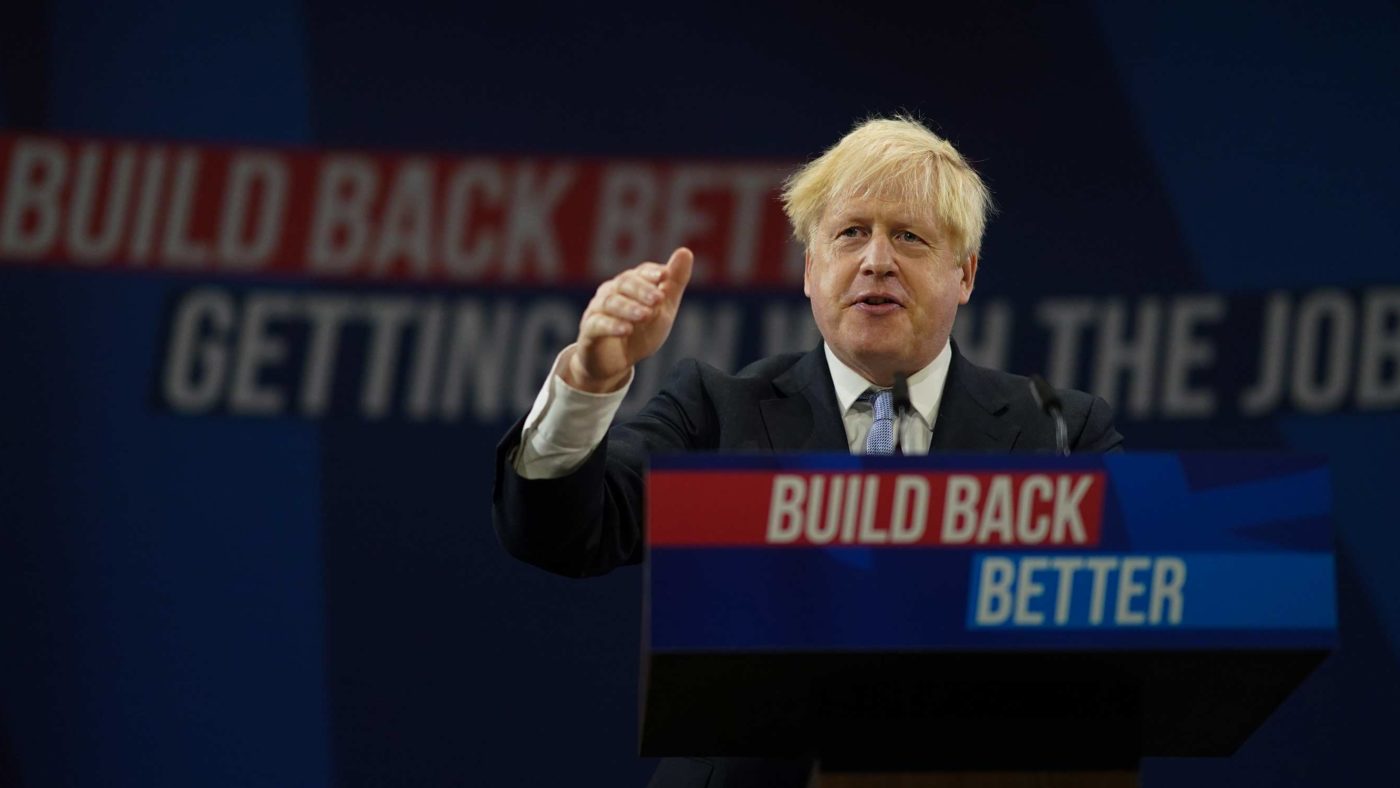So, job done. Three days of wine-soaked back-slapping business card swapping and brow-furrowing panel debates were rounded off with a speech straight from the Boris Johnson Greatest Hits collection.
Where Keir Starmer offered a long, often dreary tour d’horizon, Johnson was more interested in shooting for the moon, powered by rhetoric and unstinting chutzpah. At 45 minutes his address was also almost half the length of Starmer’s. Perhaps the PM can add ‘Build Back Briefer’ to his lengthening list of slogans.
We had all the usual linguistic pyrotechnics – lots of alliteration, a veritable jeroboam of japes, including references to beavers, otters and monkey glands. If Starmer thought his jibe about Johnson being a ‘trivial man’ struck a nerve, then it certainly didn’t seem to faze the PM himself.
More interesting than the verbal flourishes, however, was his attempt to reconcile a high-tax, largely state-led agenda with the instincts of party members keen on low taxes and governmental minimalism. Invoking the ‘finger wagging’ of Margaret Thatcher to justify higher taxes was a neat gambit, but if the UK is drunk on public spending, then higher growth, rather than squeezing the pips from an already overtaxed working population, is surely a better route to fiscal sobriety.
He talked a good game on a ‘high wage, high skill, high productivity economy’, without really offering much clarity on how the Government will get there, aside from a slightly strange nod to 19th century Italian polymath Vilfredo Pareto. Certainly, boosting wages simply by constraining the labour supply is not a route many economists would recommend. Even cheekier was the Prime Minister’s description of ‘demand surging’ as if that was an unequivocally good thing, without mentioning the corollary that in several sectors supply is manifestly failing to keep up.
Perhaps most galling in policy terms was Johnson claiming that the Government is ‘turning the tide’ on housebuilding, while also arguing that we should build on brownfield and not ‘jammed in the South-East’ – both arguments lifted straight from the Great Nimby Book of Balderdash. Ensuring that growth is more widely shared is a worthy ambition, but will take years if not decades. The idea that the emphasis in the interim should not be on building more housing in the part of the country most desperately crying out for it is not so much counter-intuitive as brazenly counter-factual.
In both tone and content, this was vintage Johnson, in the sense that he wanted to offer a bit of something to everyone. The lip service to Thatcherism and entrepreneurs for the Tory faithful, the slavish praise of the NHS for the rest of the country.
Those hoping for a set of concrete policy announcements will of course have left disappointed. But there’s no iron rule that a conference speech has to be packed with new proposals. If anything, Keir Starmer’s keynote at Labour’s own conference suffered from having so much policy in it that even politics nerds would struggle to remember it all.
Equally, as our editor-in-chief noted, the Government is soon going to have policy coming out of its ears, with the COP26 conference, a Spending Review and a Budget all coming soon, and the enormous, risk-laden, complex commitments of Net Zero and the still rather nebulous Levelling Up agenda rumbling away in the background. (On a side note, this week in Manchester you couldn’t move for panels events trying to glean what Levelling Up actually means, though I’m not sure many delegates will have emerged much the wiser. The new Levelling Up minister Neil O’Brien, one of the most thoughtful MPs on the Tory benches, has now offered us the official definition, but I’m not sure it got us much further.)
Ultimately, however, the aim here was to offer a little raw meat to party activists combined with Johnson’s usual combination of jollity and escapism. The Prime Minister didn’t so much skate over our supply chain problems as ignore them: only once did he mention gas, despite another enormous spike in wholesale prices today presaging further pressure on household budgets.
The Government’s opponents will doubtless consider this a sign of complacency, but I would suggest the opposite. These are problems so daunting the PM would rather avoid calling a spade a space – though he’d probably call it a ‘great thrusting instrument’ anyway.
But even if the policy problems in front of the Government are deep, complex and require long-term and often long-winded solutions, on the politics one senses that the Tories have crafted a potent set of attack lines. His attacks on ‘tired old Labour’, Islington, wokery, Corbynites and the rest of it were not just tummy-tickling for the base, but a concerted attempt to poke the festering, unattended wound at the heart of the opposition. As it stands, Labour are not so much an opponent to worry about, but an asset to be deployed.
The real danger to the PM’s prospects lies in the less predictable and less controllable area of the economy. If our current problems persist and inflation starts taking hold, he will need more than pithy slogans and fluffy phrasemaking to see him through.
Click here to subscribe to our daily briefing – the best pieces from CapX and across the web.
CapX depends on the generosity of its readers. If you value what we do, please consider making a donation.


